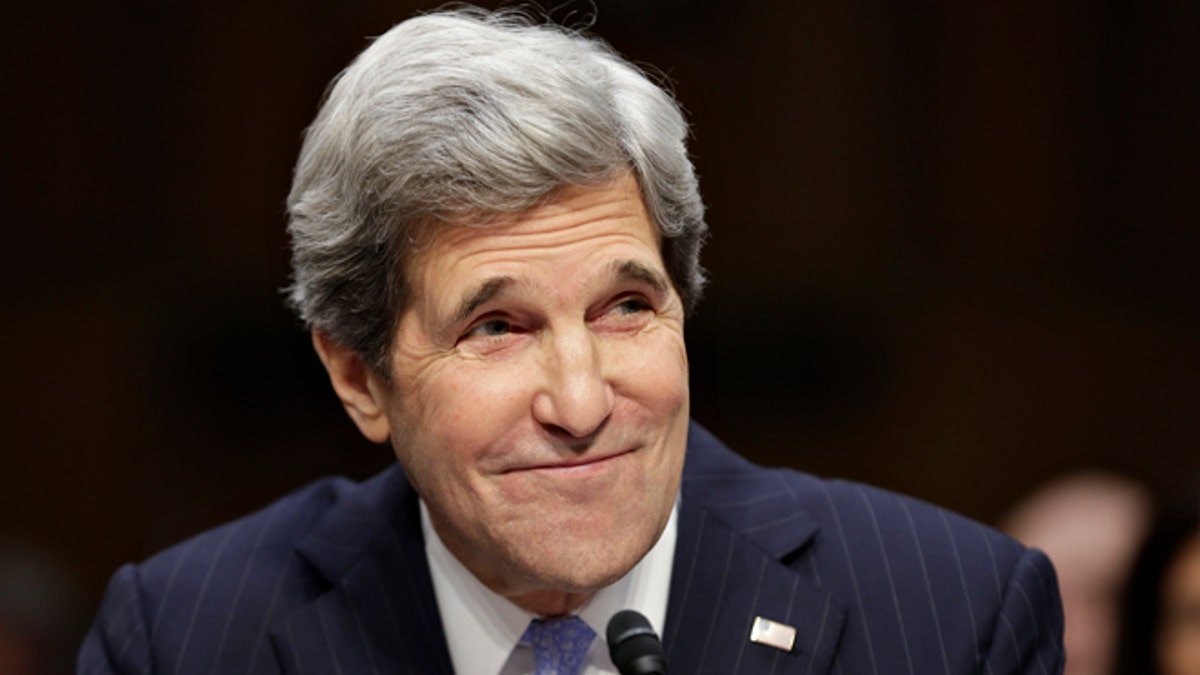
FILE: Jan. 24, 2013: Then-Sen. John Kerry, D-Mass., sits before a Senate committee during his confirmation hearing to be secretary of State. (AP)
Secretary of State John Kerry expressed optimism Sunday about a deal to end Iran’s nuclear program despite failed talks this weekend, but said the United States would not ease sanctions and was neither “blind” nor “dumb” about Iran’s sincerity or motives.
“I think it’s a question of how it can be done,” Kerry said on NBC’s “Meet the Press.”
Weekend talks among world leaders in Geneva broke down and ended Sunday over whether Iran would stop its domestic nuclear enrichment program.
Kerry downplayed news reports that France’s hard-line stance nixed the deal, saying the United States also needed more “clarity” about the terms of the proposed deal, which he described as a temporary halt to Iran’s nuclear program until a full deal can be reached.
“I think there was unity there in getting it done,” Kerry said. “It’s the first step in an effort to lock and set back” Iran’s nuclear program. … "The program is not going to grow.”
Iran President Hassan Rouhani appeared to confirm how the deal broke down, saying Sunday after talks ended with world leaders that his country would not be pushed to stop enriching uranium.
The remarks came as Rouhani and his envoys sought to assure hard-line critics that Iran will not make sweeping concessions in the negotiations, which are scheduled to resume Nov. 20.
In an address to parliament, Rouhani said uranium enrichment is a "red line" that cannot be crossed.
"Nuclear rights in the international framework, including uranium enrichment, on its soil" are not negotiable, Rouhani was quoted as saying by the semiofficial ISNA news agency. "For us, red lines are not crossable."
Kerry said that military action to stop what much of the world believes is Iran’s effort to build a nuclear weapon was still on the table.
He also said the crippling economic sanctions that Congress imposed on Iran will remain in place, while a top Senate Democrat suggested Hill lawmakers might impose more as an “insurance" policy.
Sen. Bob Menendez, D-N.J., chairman of the Senate Foreign Relations Committee, told ABC’s “This Week” that additional sanctions would be a message to Iran to say, “You know what’s coming.”
Tennessee Sen. Bob Corker, the top Republican on the foreign relations committee, told NBC that Kerry will go to Capitol Hill later this week to brief lawmakers on the matter.
The negotiations are between Iran and the five permanent members of the United Nations Security Council -- the U.S., Great Britain, Russia, China and France.
Israel is calling for a full dismantling of Iran’s nuclear production infrastructure, with Prime Minister Benjamin Netanyahu strongly objecting to negotiations.
French foreign minister Laurent Fabius said earlier this weekend that the talks managed to narrow differences without eliminating them, saying there are "still questions to be dealt with" in future rounds. He also told France-Inter Radio that France did not want to be part of a "con game."
On Sunday, hours after Rouhani's address, British Foreign Secretary William Hague told the BBC that there was a "good chance" of a deal being done with Iran, but added that the next round of talks would be "formidably difficult."
Iranian state TV strongly criticized the French position, calling France "Israel's representatives at the talks."
The West and its allies fear Iran's uranium enrichment labs could one day produce weapons-grade material. But, in an important shift, the U.S. and others no longer appear to demand a complete halt to enrichment and are concentrating on curbing the highest-level production, currently at 20 percent.
Such material is needed for Iran's lone research reactor, which makes isotopes for medical treatments, but is only just several steps away from warhead level at more than 90 percent enrichment. Energy-producing reactors use uranium enriched at levels of about 3.5 percent.
Iran insists it does not seek nuclear weapons and says its reactors are only for electricity and medical applications.
On Thursday, when the prospects for an agreement appeared brighter, Netanyahu called the proposal the ‘deal of the century’ for Iran.
Iran, which denies any interest in such weapons, runs more than 10,000 centrifuges that have created tons of fuel-grade material that can be further enriched to arm nuclear warheads.
It also has nearly 440 pounds of higher-enriched uranium in a form that can be turned into weapons much more quickly. Experts say 550 pounds of 20 percent-enriched uranium are needed to produce a single warhead.
Among the terms to which Iran would purportedly have to agree are: to stop enriching nuclear fuel to the 20 percent purity; render unusable most of its stockpile of such fuel; not to use advanced IR-2 centrifuges, which can enrich nuclear fuel five times faster than older centrifuges and not to activate a plutonium reactor at Arak.
In turn, the super powers, including Russia and China, purportedly would unfreeze some Iranian assets held in banks overseas and consider easing sanctions banning trade in gold, precious metals and petrochemicals.
Any agreement would be a breakthrough after nearly a decade of mostly inconclusive talks, but would only be the start of a long process to reduce Iran's potential ability to produce nuclear arms, with no guarantee of ultimate success.
Iran says it expects Arak, the plutonium producing reactor, to be completed and online sometime next year. It would need additional facilities to reprocess the plutonium into weapons-grade material and the U.N.'s nuclear agency monitoring Iran's atomic activities says it has seen no evidence of such a project.
The White House has said President Obama called Netanyahu to update him on the ongoing talks and said Obama affirmed he's still committed to preventing Iran from obtaining a nuclear weapon.
The Associated Press contributed to this report.
